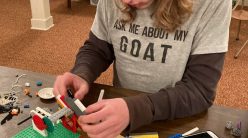
Is your homeschooled high schooler looking for great electives that count towards graduation, look good on a transcript and are also interesting? There are hundreds of great ones to choose from.
Here are 50 great electives for homeschooled teens to consider.
- psychology
- photography
- PE
- art
- agriculture/botany
- astronomy
- creative writing
- sociology
- women’s studies
- art history
- music/band/orchestra
- martial arts
- theater
- cooking
- woodworking
- child development
- archery
- ecology
- auto mechanics
- computer science
- animal science
- driver’s ed
- philosophy
- Latin
- civics
- life skills
- mythology
- accounting
- business law
- business management/ownership
- choir
- debate
- nutrition
- dance
- geology
- economics
- Native American history
- religious studies
- journalism
- physiology/anatomy
- Regional history (African, Russian, etc.)
- Regional literature (French, Chinese, etc.)
- typing
- architecture/drafting
- poetry
- statistics
- speech
- archeology
- music appreciation
- web design
Of course, this is just a fraction of the possible electives for homeschoolers! Use it as a jumping off point to come up with your own list with your child.
Keep in mind that any extra class can be an elective, even if it ordinarily counts towards graduation requirements. For instance, if your child loves science and is already earning 4 credits in sciences through traditional science subjects like earth science, biology, chemistry and physics, she can count additional sciences like astronomy, botany and environmental science. A math lover might satisfy his 4 credits of math through Algebra one and two, Calculus and Trigonometry, and then choose to also study math subjects such as geometry, accounting and statistics in addition.
Teens can also be very creative in designing their own electives around their interests, hobbies and skills. Passions like graphic art, archery and app development are perfect fits for electives. Volunteer work can also be very effectively counted towards electives. A child who volunteers weekly at a Native American historic site could log it as Dakota Studies, and one who volunteered at a vet’s office could count veterinary science.
How should you assign credit? A general rule of thumb is that a half credit (typical for electives) is earned by 75 hours of study. This translates to about three hours per week for half of a year (25 weeks), 25 hours a month for three months, or a mere two weeks of full time volunteer work of forty-hour weeks.
Be sure to look into the admissions requirements of your teen’s preferred colleges to see if they require specific or additional classes besides your state’s graduation requirements.





